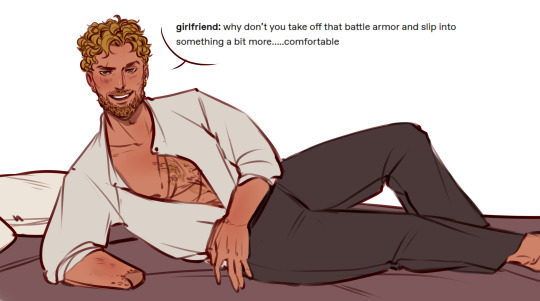theboombutton
4K posts
Call me Button. I'm a mid-30s cishet white woman. I mostly post about Rusty Quill and Eskew Productions podcasts. Started streaming at https://www.twitch.tv/boombutton . Come hang out if you like.
Don't wanna be here? Send us removal request.
Photo


jb bedding [real]
3K notes
·
View notes
Text
yiou can only reblog this post on july 17th dont reblog it on any other day or you will be boiled
14K notes
·
View notes
Text
really interesting to me how all of hayward's introduction is about establishing that, yes, he is Good Cop, he comports himself amiably and has a derision for police culture and mostly just wants to prevent people from Dying Badly, and none of that matters because he's still acting in service of the law and the law is fundamentally unjust because all it does is reinforce hierarchies by rewarding the rich and punishing the poor for doing the exact same things. and then after we get to know him we're still introduced to Bad Cop, a man for whom police brutality is not only his job but also his passion and who sounds like everyone's first kind of okay try at doing a batman impression. I feel like the usual move would be to introduce them both at once so we first villainize daggler and slowly come to realize hayward's complicity, but nope. hey kids do you want a character study on how the police force is utterly corrupt and no number of "good people" can fix it? now do you want to see a shitty guy die in a freak crab accident?
#tsv#hayward#i gotta say though daggler's voice takes me right out of the story#it's so bad#like it's on purpose bad#but it's just so bad
87 notes
·
View notes
Text
I think using archaic terms to get around censorship should be the norm. Calling rape ‘grape’ or using the grape emoji is ridiculous, if they’re not going to let us use the correct terminology, let’s go back to saying ‘outraged’. Calling murder ‘unaliving’ or ‘m-word’ is also fucking ridiculous. Let’s start using ‘slain’ again. They can’t ban ‘slay’ and ‘slayed’ because it is such a ubiquitous slang term that going back to the other meaning of the word would be a perfect way to skirt the censors.
#this seems like the perfect time to bring back rhyming slang#'kill' can be 'jack'#as in jack and jill
2K notes
·
View notes
Text
Rice-a-roni is famously the San Francisco treat
You know there are certain circumstances where me being from California would indeed disqualify me from having an opinion on something but people never seem to pull that card with one of those things. It’s always with one of the most random things that utterly baffle me why they’d bring up that I’m from California
373 notes
·
View notes
Text
sorry if i'm gonna be quiet for a while. my country recently introduced laws that make it so that in order to use social media to the fullest (not being able to view ns/fw content and in a few cases, not even having access to dms), i HAVE to give the sites my id/face scan.
it goes into effect july 25th. it'll probably effect here too, since this place allows mature content (tho not full on ns/fw)
i'm very distressed about it bc i might end up not even being able to talk to my internet friends. i don't really have any irl ones
if i have to disappear on most socials by then, you know why.
40K notes
·
View notes
Note
If all the characters in TMA, as well as those in TMAGP, are bisexual, according to Alex and Jonathan Sims himself, they are all the worst kind of bisexuals for me. Think abt the least worst kind of bisexual that was currently vilified on Twitter: that's them. That's my headcanon.
You're telling me there's multiple types of bisexuals?
#i'm too straight for this discourse#staying in my lane#waving friendly-like at all the bisexuals in the bisexual lane#refusing to learn which ones are allegedly bad#crashing my car because i took both hands off the wheel to wave at the bisexuals#tma#tmagp#asks#ask button#ask boombutton#ask theboombutton
4 notes
·
View notes
Text
abandonware should be public domain. force companies to actively support and provide products if they don't wanna lose the rights to them
141K notes
·
View notes
Text
It's important to remember that "neurotypical" just means "still able to cope with society's demands and expectations well enough to avoid being psychiatrized". It doesn't refer to some idealized super human who doesn't have any problems, doesn't struggle with anything, never does anything weird and who thrives under the status quo.
6K notes
·
View notes
Text
TMAGP vague
I've seen a bunch of general posts in the tmagp vague tag and realised that the lore of the vague tag might not be known to everyone so:
The tma vague tag was instituted as a way for patrons with early access to post vague* spoilers or impressions about upcoming episodes. Restricting it to the vague tag meant that people could easily block it if they wanted no spoilers whatsoever and ppl who found it fun could easily seek it out.
It was a good system that kept early access stuff out of the main tag and I think we should stick with it for tmagp.
*Emphasis on the vague part. No genuine spoilers but a lot of incoherent sobbing/screaming or memes that related to the episode in unexpected/circuitous ways.
246 notes
·
View notes
Text
Since this episode was written by Jon Ware, I'm going to headcanon that the monster was a certain minor god from The Silt Verses and you can't stop me
10 notes
·
View notes
Text

#so you know that childhood lead exposure graph that goes around#with gen x getting the worst of it#and you know how people are staying healthier further into old age#i wonder if we'll see a longevity and health-in-old-age dip in the next couple decades#as the leaded gas generation gets up in years#lead
232 notes
·
View notes
Text
With everything happening in the Girl Genius plot right now, I am here to ask the important questions, like:

She is an English cat from an English (underwater dome) lab, and I think she should have the accent to match.
...Look, I'm not going to outguess our Professors on the big climactic events of the entire Second Journey that they've been working on for a decade plus, and neither are you. I want to know about the cat.
(bonus: pick your British actress and tell me Prrrriti's voice actor for the BBC miniseries Professoressa Kaja has declared will happen one day)
#her early exposure to brits is irrelevant because she didn't yet have a language instinct#seffie was responsible for her education post-uplift#furthermore m'reau seems very french#prrrriti m'reau#girl genius
35 notes
·
View notes
Text

121K notes
·
View notes
Note
good lord WHAT is your job?
I'm a software engineer for Microsoft. Which is a job I DID honestly enjoy quite a lot until whatever the hell's been going on lately.
Like imagine you're an architect and you get pulled in to help build a house. And it's a pretty well-engineered house! You can recognize and appreciate this and contribute the same standard of quality.
Until the guy who controls all the money shows up one day and says houses are NO good anymore. People want a BOX for the AI to live in. And actually start tearing down walls and ripping out the electrical and plumbing because the AI doesn't work with all that. Just make it a BOX for the AI.
So you do what they say and rip out things you're proud of and smash holes to drag all the AI through. But the AI is constantly changing and no one knows who you should ask to understand the shape the house needs to be to fit the AI. And the people who do know are probably too busy getting their necks breathed down by members of leadership who are paid millions a year to tell you to just do whatever ChatGPT does. So your team gets dicked around with unclear instructions given with absolute urgency. Also every 6 months they lay off 3% of the company so you walk in one day and Bob who's worked here for 25 years is just gone.
Also the AI is supposed to get good enough at building houses to replace your job. Maybe. It doesn't actually do that but the guy who controls all the money is hinging all that money on convincing other people that's true.
I miss house.
7K notes
·
View notes
